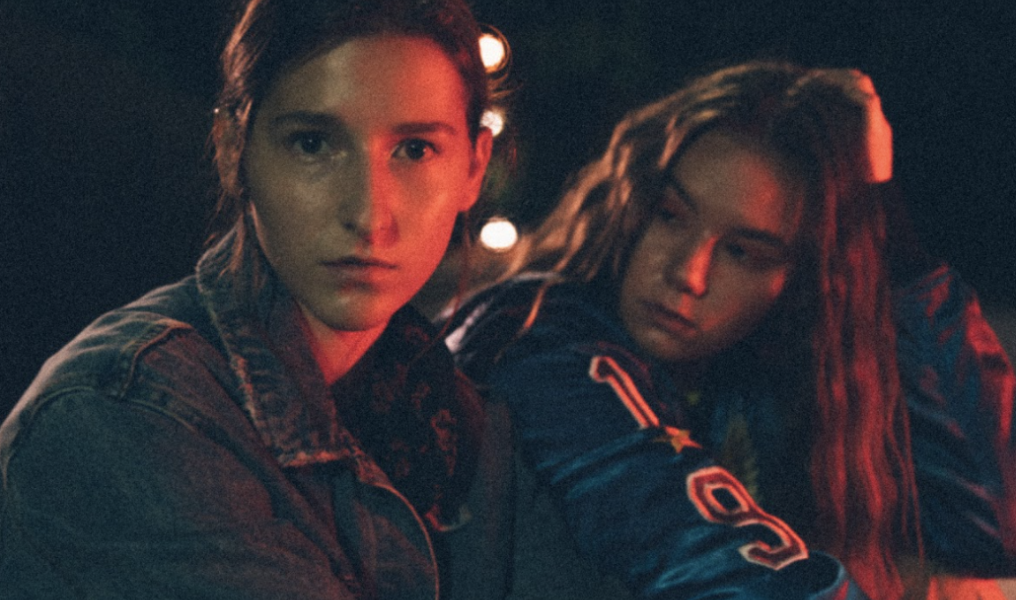While everyone's upbringing is different, we can all think back to our most formative moments. More likely than not, those memories come from our adolescence, when we experienced a heightened version of reality — like the feeling of a first kiss, or really letting loose on a dance floor. That's the lens through which Polish Director Kamila Tarabura's new coming-of-age film "Into the Night" explores those first tastes of freedom before the responsibility of adulthood sets in. The winner of the Best Live Action Short Film Award at the 36th annual Warsaw International Film Festival, "Into the Night" tells the story of Krysia, a depressed young girl who is made to go to a party by her mother. Unexpectedly, she bumps into her classmate Majka, and the two girls ditch the event to make their own fun.
Not only a look at today's youth culture, the film tackles subjects like mental health, the shedding of societal expectations and the exploration of one's sexual orientation. While LGBTQ+ representation has become more popular in film the world over, what makes "Into the Night" special is that it comes from a country that has made international headlines in recent years for its strict anti-LGBTQ+ policies and conservative political culture. Via Zoom, Tarabura explained to PrideSource why a film like this one is necessary for kids whose identities feel suppressed, what it was like exploring LGBTQ+ themes in an unfriendly political environment, and how the message of "Into the Night" extends across cultures.
Had you ever done a film with LGBTQ themes?
Yeah. In film school I did the film "Never Ever," and it explored the relationship between a mature woman who was in her 40s with a very young nurse who was taking care of her mother. There was some sexual tension. And, in fact, there was a scene with a moment of death, and it turned into something sexual. Like the moment when you feel this overwhelming love, and it somehow transitions into [something sexual]. So, this was the first film in my career where I explored LGBT themes, but I never had the idea to do a film just for this purpose. It's an element of the story, but it's not the most meaningful factor. For example, in "Into the Night," it was connected with the fact that when I remember my adolescence, I was much more gender fluid and I can't say today if I was always straight or lesbian, I was just attracted both to girls and boys. And I never wanted to label that. I remember it was somehow natural, and it was important for me to show in "Into the Night" that we don't need to label anything that the people who try to put things simply are usually the adults, the system and, in fact, love is love. In this story, where it's about searching for one's identity, it's even more significant that we don't need to have the answers for all the questions when we are young. We are creating ourselves and we should have the courage and time to explore; it's nothing to feel sorry for. I'm emotional when I talk about that because of the political situation in Poland, the whole discourse around LGBT [issues], it shouldn't have a place in the 21st century, what's going on. The fact that there are politicians who talk about the "LGBT ideology" is just disgusting manipulation, and I felt like I wanted to show that there are people, there are no strict rules, and it depends on each moment of life and each story.
What was shooting this film like in an environment that maybe isn't so accepting of content like this right now? I know that Poland has anti-LGBT zones in certain places.
Yeah, but you should imagine that there's two different realities in Poland. One reality is of people who, I don't know, feel fear and they are afraid of things they don't know about. And when they watch the Polish national TV they hear about the "LGBT ideology" that wants to influence their children. These are people who listen to all that stuff all the time, and they start to believe that it's really possible that a 5-year-old boy will see a homosexual couple on the street and that maybe he will think he's gay. What kind of thinking is that? But I'm part of the filmmaking industry and artist community, and people are more open-minded in my natural habitat (laughs). There is a very strange situation in Poland. You know that there is a large group of people who thinks totally different and they are anti-everything, which, in fact, means they are against freedom. But when I talk with my friends, when I talk with people in my work in the film industry, this is a different reality. And we didn't have a problem with having this film in production. [LGBT themes] never were an obstacle.

Polish Director Kamila Tarabura. Courtesy photoo.
This seems very similar to the atmosphere in the U.S., in some regard, because there are distinctly different conservative and liberal groups. And some would like the LGBTQ+ community and our rights suppressed.
I read a report about the situation of psychiatry in Poland. I'm not sure if you know, but we are in second place in the entire Europe when it comes to suicides among teenagers. We are almost the worst, there is only Germany, in first place, but they're a much bigger country. I read this report, and a lot of the kids who try to commit suicide are LGBT, and I tried to understand what's going on. It seems like we have the access to Netflix productions, to HBO productions, which tell you we are who we are and to be yourself. And this is such contrast. When you are a kid, you watch films that are coming from the whole world and they are trying to encourage you to say, "OK, this is me, and this is who I am," and then you go to school, and you hear that there is something wrong with you. When I compare pop culture to when I was a teenager in the 2000s, I remember it was always a taboo. I knew there were some kids in my school who were homosexual, but it was always a taboo. And there were no films at all; it was just a topic that didn't even exist. And now this is the moment that the world is saying, "Go for it. Be yourself," and the political situation and a big part of our society is still against this. Our ruling party is openly trying to call people to be against [LGBT] rights.
When did you realize that this film could qualify for the film festival?
Our film was finished at the moment the whole pandemic situation started. There were a lot of festivals we were submitted to and then we got information that they were canceled. It was some kind of a miracle that the Warsaw Film Festival actually was organized in-person, and we had this great chance to show our film to the public in the cinema. And when we were submitted to the Festival I was very happy, because I know this festival's spirit, and I really love it. Also in this film, there is a lot of music that's very popular in Warsaw right now. When I was creating the film I was in contact with many kids and teenagers from Warsaw, and they sent me their Spotify lists so that I could listen to the music they listened to. So, in a way, we collaborated on this film with a large group of teenagers because they were our consultants. We talked a lot about the characters and so on. And I always felt like it was a good idea to have a world premiere at this particular festival and to invite all the people who are involved. I was super happy when we got to know that, thanks to that award, we are Oscar-eligible, and we can start this international tour. The jury was international, and I was so happy that the story resonated with them, because I was very curious how they would read this story, and they really liked it. So I understood that it can work internationally and it can be close to people all over the world.
It did seem like this story, though it is very connected to modern-day Polish culture, can be relatable to anyone. Watching it I could relate to the coming-of-age aspect of the film. Krysia says something at one point about when you don't own any part of your identity, it feels like you don't have any will to live and be yourself. I thought that was a great observation. Did you have a coming-of-age movie when you were growing up?
As a person who was born in the ‘90s, I was totally an animated Disney films fan, but there was a film of Gus Van Sant's called "Paranoid Park." The intimacy of the story was something that really attracted me. The story was told from the perspective of a boy, but it was so intense inside his head. I think it was the first thing that was really touching for me. This sort of a focus on the character and observing him when he just is, it's not even about giving a great dialogue, it's the moment of observing someone's glance or a small gesture or just being silent. And, sometimes, it means much more than words. And I think it's especially important in the films that are about young people. Personally, I remember I had very big problems with communicating with my friends in school, because when I was in secondary school there was [a boom] of [online messenging]. So after school we were writing on Gadu-Gadu, which is like an instant messenger. I remember I could have conversations on this and later in school I couldn't have a deep relationship with anyone. I remember I had a boyfriend who was my boyfriend only on the messenger and in school I couldn't have any conversations with him. I remember we were traveling with our class to London and I was sitting in the bus just a row behind his, and there was a little hole between the seats and we just held hands. We held hands for 20 minutes, and we didn't talk, but it was so meaningful to both of us because we almost never spoke to each other in school. I believe that this kind of storytelling really reflects how sometimes we are lonely and very much in our heads. We live in our own minds, analyzing everything and sometimes afraid of what others will think of us.
I heard that there are plans to turn "Into the Night" into a TV series. Will those coming-of-age themes be incorporated there also?
The TV series will also be a coming-of-age story, but it's told as a series, so it's not like "Into the Night." It's extended to a longer format with episodes and so on. But in the process of a filmmaker's career, it's natural that you have to do a short film first just to show the industry that you can deal with storytelling. My husband always told me that I should do a short film, and when I met a screenwriter, Nina Lewandowska, who was a student of the national Polish film school, she showed me her screenplay. And I guess it was because I had a transition, when I was 14, from a very energetic child to a very withdrawn teenager, but the story of a shy and depressed Krysia was somehow close to me. And also, I have a sister who is 15 years younger than me, so I had a mission to do this film for her and for her generation.
What message do you hope young viewers take from watching "Into the Night"?
I want to make them feel that they can be whatever they want to be, whoever they want to be, and that they can explore and they can make mistakes and that they don't need to label themselves and try to be as someone imagined them to be. Especially according to the relationship of Krysia and her mother. And from the perspective of an adult viewer, I will quote my friend who is a mother. She watched the film, and she said that, for her, it's a story about how teenagers and children need to have their own world. Even if they put themselves in danger sometimes, it's better and healthier for them to have their own world with their own friends with their own needs than trying to be in control as a parent all the time. So, basically, for her, it was about freedom. And really, as I receive the messages from the viewers who watched the film at the festival, it resonates with them that way. I had some messages from teenagers who wrote to me that they feel actually like Krysia, so it's amazing to feel like you created a character, which somehow is authentic for young people.











